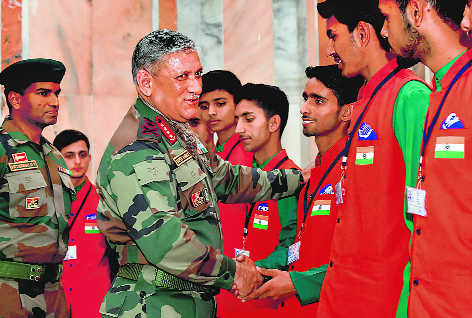
PTI file.
Saba Naqvi
Saba Naqvi
We in India have many things going for us. Among nation states that emerged after centuries of colonisation, we are the one big country that’s practiced a seamless electoral democracy without any danger of military coups or army takeover. We are special in that regard and it’s not something we should take lightly.
Look what’s happened to Pakistan through half its history; General after General till Zia ul Haq entered a great game with the US and Saudi Arabia to expand influence by changing the nature of Islam in the region, with consequences for the rest of the world, including us. Look what happened in Egypt, where Gamal Abdul Nasser (once a great friend of Jawaharlal Nehru in the Non-Aligned Movement) was first a liberator and then established his own autocratic rule with the military under him. Look what happened in Indonesia where military coups (remember figures such as Sukarno and Suharto?) became a feature of contemporary life after centuries of colonisation by the Dutch. And don’t forget the 1982 military coup in Bangladesh by General HM Ershad, then army chief. The history of the developing world is embedded with coups, assassinations, military juntas.
Let’s give Jawaharlal Nehru some credit for what we are today. We can and do contest the ideas that are the cornerstones of Nehruvian socialism and secularism. But we can hardly contest the fact that as India’s first Prime Minister from 1947 to his death in 1964 he oversaw our transition from colony to sustainable democracy. I wonder if it would have turned out the same way had daughter Indira Gandhi been the first Indian Prime Minister?
We are indeed special because there is indeed no chance of a military takeover in the forseeable future. That is precious. But there is far too much visibility of the armed forces today in a manner that disturbs the balance that has served us so well. Traditionally, our armed forces were rarely in the public domain even though we have fought wars with two neighbours, China and Pakistan, and sent troops into Sri Lanka, besides sending some of the largest contingents in UN peace-keeping forces across the world.
That is why the loquaciousness of the current Army Chief General Bipin Rawat is disruptive. He is off course entitled to free speech but as the serving Chief of the Army of the world’s largest democracy he has to watch his words. In the public domain he should be guarded and reserved as former chiefs have been. General Rawat seems particularly inclined to express opinions that could be deemed political or have political consequences. In doing so he is transgressing the traditional line we have maintained between domestic politics and the military establishment.
In his defence it can be argued that the armed forces have been dragged into the public sphere in recent times by the electronic media that seems to thrive on chest-thumping debates for which the simplest format is Us vs Them (that could be Pakistanis, Kashmiris, Bangladeshis, Rohingyas, mostly Muslims on any given night, with the exception of the Chinese).
The visibility of the armed forces is also a consequence of the politics of the day, where military might is invoked by the political class and specific operations are sought to be owned by the ruling party. In all fairness, this happens across the world as war does, if briefly, make for good politics, as it can unite citizens over their differences. In India, the Bangladesh war was owned by Indira Gandhi, the Kargil war by Atal Bihari Vajpayee and the surgical strikes (not quite war) by Narendra Modi. But there are consequences if the state appears to be at war with a section of its own citizenry.
General Rawat’s remark comparing the growth of the AIUDF with the BJP would increase anxieties in the north-east (especially as the process of compiling the National Register of Citizens is ongoing in Assam). It’s possible the General spoke in a forum where he thought that Chatham House rules applied, but even so his words seemed to suggest that the growth of one party with a vote bank that caters to Bengali-speaking Muslims in Assam, is possibly unwelcome. A serving Army Chief does not express political preferences. The General also referred to a design by Pakistan and China to increase migration to the north-east.
The consequence was pitched news shows that only bring the armed forces into the filth of daily politics. In one of the TV shows at 8 pm, I heard an anchor ask another former chief whether the movement of “people of a particular community” was a deliberate act of war by China and Pakistan. To the credit of the Army man, who had been in charge of the Eastern Command, the reply was that in his view the movement was primarily due to economic reasons but he believed the current chief thought he would not be quoted.
The Army has been pitched into the political arena. That is one space it needs to withdraw from. Swiftly.



























